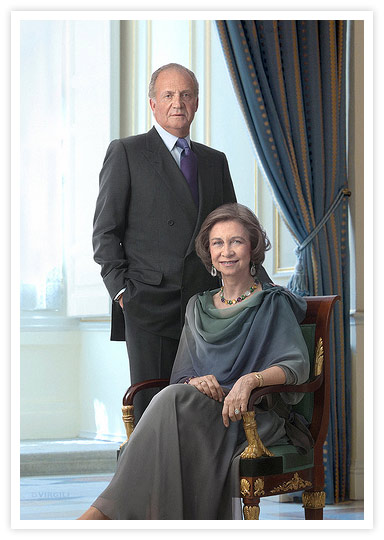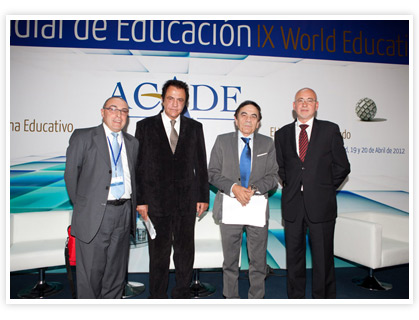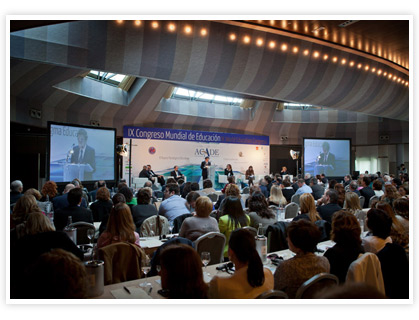| World Confederation of Education - COMED |
| Madrid. Spain - 2012 |
Historical Abstract
IX World Congress of Education (2012)
“The new educational paradigm. The journey has begun.”
Honourary Committee Presidents:
Their Majesties, the King and Queen of Spain

Members:
- Mariano Rajoy - Spain
- José Ignacio Wert - Spain
- Esperanza Aguirre - Spain
- Ana Botella - Spain
- Alicia Delibes - Spain
- Alvaro Marchesi - Spain/OEA
- Joan Rosell - Spain
- Arturo Fernández - Spain
- Jesús Núñez Velázquez - Spain
- Edgardo N. De Vincenzi - Argentine
- Patricia Churchland - USA
- Richard Gerver - United Kingdom
Madrid (Spain), which is one of the most important artistic and cultural centers in the world, hosted from 19th to 20th April 2012 at Hotel Mirasierra Suites, the IX World Congress of Education, organized by COMED (Confederación Mundial de Enseñanza Privada - World Confederation of Private Education) and ACADE (Asociación Española de Centros de Enseñanza Privada - Spanish Association of Private Education Centers), assembling 512 congressmen and representatives of over 200 organizations and associations around the world which comprise more than 75,000 centers where over 28 million of students are educated every year.
Some of the congressional debates concerned issues such as the following:
Does it make sense to sustain an educational model based on the principles and requirements of the Industrial Revolution during this global digital era? What should be changed in the teaching-learning process? Which new contents should be implemented? Which systems, resources and new technologies can be adopted? And ultimately: What should be changed and how?
The debate on the present and immediate future of education, no matter how confusing, uncertain, complex, different, but exciting might seem, was the focus of the dissertations delivered throughout the congress. Leading world experts in education gave answers to such key concerns by putting forward solutions and alternatives, and presenting innovative experiences in which the path leads to the new paradigm of education.
Statement of Madrid (Brief)
- All States of the world must guarantee: the effective implementation of educational rights, universal quality education for all citizens, freedom of teaching and learning and choice of school, the individual’s fundamental rights protected by the national Constitutions, and international covenants and treaties, including the Universal Declaration of Human Rights, the International Covenant on Economic, Social and Cultural Rights, the International Covenant on Civil and Political Rights, the Protocol on Human Rights, among others.
- The new educational paradigm must address the needs that the new society demands in this globalized world characterized by continuous chance and the consequent need for adaptations strategies.
- New Conceptions of the Teaching Process - “Learning” and “Educational Organization”.
- Open Curriculum: Technology.
- Permanent Active Learning.
- Neurological Research.
- Emotional Intelligence - Emotional Competence.
- Quality in Teacher Training Education.
- Language Teaching.
- Science Education from Early Childhood Education.
- Development of Social and Humanistic Values.
- Education as Responsibility for everybody.
Madrid, 20th of April 2012


